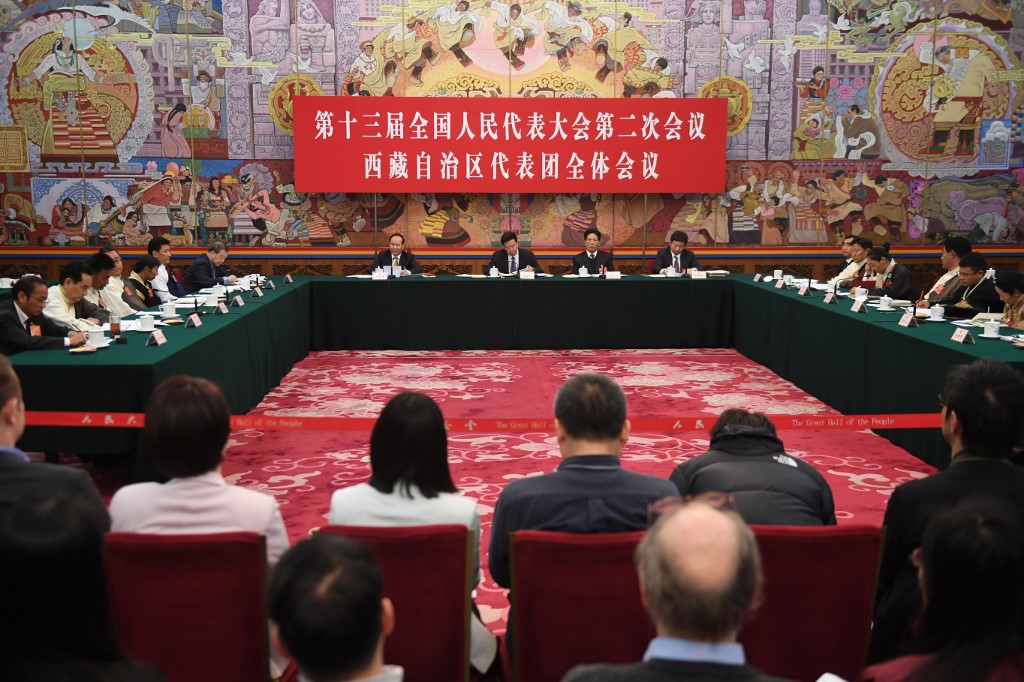China’s annual parliamentary gathering, delayed by the coronavirus pandemic, opens next Friday amid expectations the meeting will announce a lower growth target and greater fiscal support for the world’s second largest economy, with an eye on stabilizing employment.
The National People’s Congress (NPC) session starts on May 22 and will be watched for important far-reaching announcements, especially after the economy shrank in the first quarter for the first time since 1992.
“We think Beijing will most likely substantially lower its 2020 GDP growth target due to the severe blow from Covid-19 on China’s and the global economy,” Nomura’s Chief China Economist Ting Lu said, adding that there was a small chance that Beijing could even abandon its growth target for the whole year.
Standard Chartered Bank economists Shuang Ding and Hunter Chan said there was a low probability of the growth target being dropped entirely. They believed it more likely that the NPC would set an indicative growth target of 2-3%, implying average growth of around 5% from Q2-Q4 this year.
However, they did acknowledge that some policy advisors have questioned the desirability of setting a growth target amid the sharp Q1 economic contraction, an impending global recession and worsening US-China relations.
This year is the final year in China’s 13th five-year plan, which had among its key targets a plan to double the country’s GDP between 2010 and 2020 via GDP growth in the region of 6%. This would have been a timely accomplishment on the eve of the 100th anniversary of the Chinese Communist Party.
But such growth targets are being discouraged by several official quarters, most prominently by Ma Jun, a policy adviser to the People’s Bank of China.
Fiscal policies better than monetary stimulus?
Attention is also focused on fiscal measures, as it is widely perceived that China’s policy-makers see fiscal policy as more effective than monetary policy in reviving the economy from the pandemic shock. The government is expected to announce a fiscal deficit target during the NPC, both in value terms and as a percentage of GDP.
JPMorgan analysts said one would be able to derive underlying assumptions on nominal GDP growth embedded in the fiscal report. They said the 2019 fiscal deficit target (2,760 billion yuan or 2.8% of GDP) implied 7.2% nominal GDP growth, versus a 6%-6.5% real-GDP-growth target and nominal GDP growth of 7.8%.
They said there are three key figures to be tracked – the annual fiscal deficit target, the quota for special local government (LG) bond issuance and the quota for the special Covid-19 government bond.
“The fiscal package included in the fiscal report will reach 7.7% of GDP. Adding in off-budget items including net land sales and local government financing vehicle (LGFV) debt, the augmented fiscal deficit will hit a new historical high at 14.3% of GDP this year, 2.4%-pts higher than in 2019,” the investment bank said in a report which forecast the fiscal deficit would rise to 3.2% in 2020 from 2.8% a year ago, the first breach of the 3% threshold. It also forecast the special local government bond quota to rise to 3.5 trillion from 2.15 trillion and the quota for the special Covid-19 government bonds at 1 trillion yuan, or higher at 1-2 trillion yuan.
HSBC economists expect a higher fiscal deficit of up to 4% of GDP, special local government bond issuance of 3.7 trillion yuan and special central government bond issuance of over 2 trillion.
“Top of the watch list are Premier Li’s Government Work Report and the Finance Minister’s Fiscal Budget Report. For the main annual policy goals, we expect Beijing to downplay a numerical whole-year GDP growth target and instead emphasise the labour market and social stability,” HSBC economists Qu Hongbin, Jingyang Chen and Shanshan Song said in a note.
China’s economy is reeling from the shock of a quarterly GDP contraction, and its leaders have articulated the threat unemployment poses to social stability. A report released by The Economist Intelligence Unit last month said at least an additional 22 million urban workers will lose their jobs in 2020, pushing up the unemployment rate to around 10%.
























